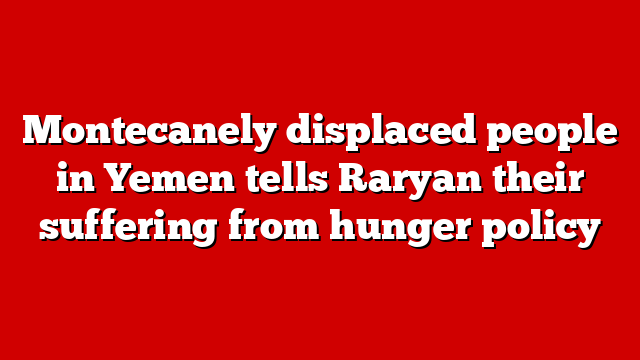10/7/2025–|Last update: 20:22 (Mecca time)
“Life here is harsh and difficult for everyone, but we are patient for the sake of our children, because they do not have a Swan, and in many nights, I sleep hungry to eat, and things are getting worse.”
The report – with the pen of journalist Saeed Al -Batati – reviewed the tragedy of thousands of families displaced in sprawling camps on the outskirts of the city, amid the exacerbation of hunger and poverty in Yemen and the collapse of international aid.
Some of the Guardian interviewed in this camp – one of several camps surrounding the city – stated that they thought seriously about ending their lives for their inability to feed their children.
According to the report, Mukalla is currently one of the relatively safe areas, as it is far from the raids targeting the Houthis in northern and eastern Yemen, and the city houses the Yemenis fleeing the scourge of war that affected more than a decade.
Many families in the camps, such as the Rabia family, depend only on bread and water, with rice and onions available rarely, and about half of the population of Yemen (more than 17 million people) suffers from severe malnutrition, according to the report.

Without money or food
Rabiaa told the British newspaper that her husband and son gathered plastic and scrap from the streets, while she and her daughter went out to sell firewood, but this effort is only generated by less than two dollars per day, which is enough for barely to buy a little flour, tomato and rice.
She added that her family was previously obtaining “food baskets from the World Food Program, and she was enough for a month, but now we can no longer even buy one bean can.”
The report indicated that Yemen is living one of the worst humanitarian crises in the world, with the high percentage of people suffering from acute hunger to 33% in 2025, compared to 21% last year, according to For the World Food Program.
For his part, the program spokesman told the newspaper that the request in Yemen exceeds the available resources, and that the agency did not obtain only a quarter of the funding needed to meet the needs in 2025.

On the brink of despair
Yassin Al -Khalidi, a teacher in the city of Taiz, southern Yemen, said that his monthly salary of 80,000 riyals (about 330 dollars) – when he arrives – is not enough for his need for the basics for a week, adding that he and his family live “on bread and tea for most days, and sometimes I stop eating in the middle of the meal only for my children sufficient.”
Al -Khalidi – who is a father of 4 children – is counting on his elderly parents, and indicated that he suffers from gallbladder, kidney and colon problems, and it is believed that these diseases are due to sufficiency for years with bread and water only.
There are moments when I wished death from the severity of despair … We live in misery every day, we struggle to get food, clean water, cooking gas, school supplies and health care, alone faith in God gives us patience for this scourge.
Al -Khalidi added that some of his colleagues had to divorce their wives or abandon their homes, because they are unable to support their families in light of the collapse of the living situation.
When the Guardian spoke to him, he said that he had not received his salary for two months, which prompted him to ask his wife to move to live with her family, and he remained in a small room that was a previous shop to avoid paying the rent.
He continued: “There are moments when I wished death from the severity of despair, we live in misery every day, we fight for food, clean water, cooking gas, school supplies and health care, alone faith in God gives us patience for this affliction.”

